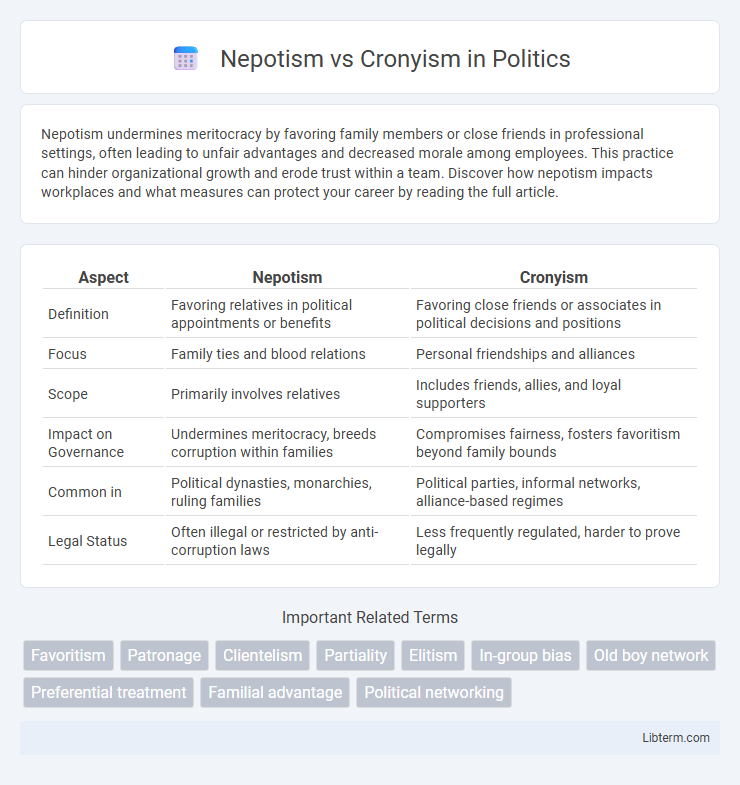Nepotism undermines meritocracy by favoring family members or close friends in professional settings, often leading to unfair advantages and decreased morale among employees. This practice can hinder organizational growth and erode trust within a team. Discover how nepotism impacts workplaces and what measures can protect your career by reading the full article.
Table of Comparison
| Aspect | Nepotism | Cronyism |
|---|---|---|
| Definition | Favoring relatives in political appointments or benefits | Favoring close friends or associates in political decisions and positions |
| Focus | Family ties and blood relations | Personal friendships and alliances |
| Scope | Primarily involves relatives | Includes friends, allies, and loyal supporters |
| Impact on Governance | Undermines meritocracy, breeds corruption within families | Compromises fairness, fosters favoritism beyond family bounds |
| Common in | Political dynasties, monarchies, ruling families | Political parties, informal networks, alliance-based regimes |
| Legal Status | Often illegal or restricted by anti-corruption laws | Less frequently regulated, harder to prove legally |
Understanding Nepotism and Cronyism
Nepotism involves favoritism granted to relatives, especially in employment or business contexts, while cronyism refers to preferential treatment given to close friends or associates regardless of merit. Both practices undermine fairness and meritocracy by prioritizing personal relationships over qualifications and performance. Understanding these distinctions helps identify unethical behaviors in organizational and political environments, promoting transparency and accountability.
Defining the Core Differences
Nepotism involves favoritism granted to relatives or family members, often in hiring or promotions, based on personal relationships rather than merit. Cronyism refers to preferential treatment given to close friends or associates, impacting decision-making processes and organizational fairness. The core difference lies in the relationship type: nepotism centers on familial ties, whereas cronyism is based on social or friendship connections.
Historical Roots of Nepotism
Nepotism traces its origins to the Latin word "nepos," meaning nephew, and has historical prominence in the Catholic Church during the Renaissance, where Popes appointed family members to high-ranking positions to consolidate power. This practice extended to monarchies and aristocratic families in Europe, reinforcing dynastic control and limited access to privileges based on kinship rather than merit. Understanding nepotism's deep historical roots elucidates ongoing debates about favoritism and ethical governance in modern institutions.
The Rise of Cronyism in Modern Times
The rise of cronyism in modern times is marked by increased favoritism in political and business environments, where personal relationships override merit-based decisions. This trend undermines institutional integrity and fuels public distrust, as appointments and contracts often favor close allies rather than qualified individuals. Recent studies reveal that cronyism exacerbates economic inequality and stifles competition, significantly impacting governance and corporate ethics worldwide.
Impacts on Workplace Culture
Nepotism and cronyism both erode workplace trust by promoting favoritism based on personal relationships rather than merit, leading to decreased employee morale and engagement. Such practices often result in reduced productivity and higher turnover rates, as qualified employees feel undervalued and overlooked for advancement. Over time, a culture of favoritism fosters resentment and undermines organizational fairness, weakening team cohesion and overall performance.
Ethical Implications and Public Perceptions
Nepotism and cronyism undermine organizational integrity by prioritizing personal relationships over merit, leading to ethical concerns such as unfair treatment and reduced morale. Public perceptions often view nepotism as favoritism within families, while cronyism is seen as corrupt alliances among friends, both eroding trust in institutions. The ethical implications include diminished transparency and accountability, fostering environments where qualified candidates are overlooked, ultimately harming societal equity and organizational effectiveness.
Legal Perspectives on Nepotism and Cronyism
Legal perspectives on nepotism and cronyism vary across jurisdictions but commonly classify both practices as forms of corruption that undermine fairness and meritocracy in employment and governance. Anti-nepotism laws prohibit favoritism toward relatives in public sector hiring to ensure equal opportunity and prevent conflicts of interest, while anti-cronyism regulations target favoritism based on personal relationships or political alliances to promote transparency and accountability. Enforcement mechanisms often include mandatory disclosure requirements, ethics committees, and penalties such as fines or dismissal to uphold organizational integrity and public trust.
Notable Examples Across Industries
Nepotism and cronyism frequently impact decision-making in industries such as entertainment and politics, with notable examples including the casting preferences in Hollywood families like the Coppolas and political appointments within the Kennedy administration. In the corporate sector, cronyism is observed in cases like the Enron scandal where executives favored close associates for key positions, leading to ethical breaches. These practices undermine meritocracy by prioritizing personal relationships over qualifications, affecting organizational integrity and performance across various fields.
Strategies to Prevent Favoritism
Implementing transparent recruitment processes and strict anti-favoritism policies can reduce nepotism and cronyism in organizations. Regular audits and anonymous reporting systems foster accountability and help identify unfair hiring or promotion practices. Providing equal access to training and development opportunities ensures merit-based advancement and diminishes favoritism.
Building Merit-Based Systems
Building merit-based systems requires clear criteria for performance evaluation and transparent recruitment processes that prioritize qualifications and skills over personal relationships. Nepotism, favoring family members regardless of merit, and cronyism, appointing friends without regard to competence, undermine organizational efficiency and employee morale. Establishing objective benchmarks and fostering accountability promotes fairness and drives long-term success in talent management.
Nepotism Infographic

 libterm.com
libterm.com